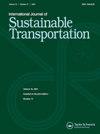集成电动汽车快速充电站与交通动态:一种实时交通流体模型方法
IF 3.9
3区 工程技术
Q2 ENVIRONMENTAL STUDIES
International Journal of Sustainable Transportation
Pub Date : 2025-07-03
DOI:10.1080/15568318.2025.2515561
引用次数: 0
摘要
在电池快速充电能力趋同和环保意识增强的推动下,电动汽车在城市交通中获得了巨大的吸引力。快速充电站(FCSs)的高效运行需要解决快速准确处理交通状况数据等挑战。本研究提出了一个流体模型,该模型利用实时交通数据来估计FCS容量,同时考虑到城市交通段中的车辆密度和速度等因素。然后采用滚动地平线调度方法,根据预估的FCS容量制定模拟的电动汽车充电计划。仿真旨在最大限度地提高FCS利用率,确保客户满意度,并响应动态功率需求。研究还考察了流体模型在不同交通条件下对运行效率的影响,并对所提出的调度方法进行了不同时间间隔的评估。通过将交通动态整合到容量估计和利用率优化中,本研究增强了FCS有效运行的策略。此外,它还为在不断变化的城市动态中优化电动汽车充电站的运营提供了实用的见解。本文章由计算机程序翻译,如有差异,请以英文原文为准。
Integrating EV fast charging stations with traffic dynamics: A real-time traffic fluid model approach
The Electric Vehicle (EV) has gained significant attraction in urban transportation, driven by the convergence of fast charging capabilities of battery and heightened environmental consciousness. Efficient operation of Fast Charging Stations (FCSs) requires addressing challenges such as the rapid and accurate processing of traffic condition data. This study presents a fluid model that leverages real-time traffic data to estimate FCS capacity, taking into account factors like vehicle density and speed in urban traffic segments. A rolling horizon scheduling approach is then employed to develop a simulated EV charging schedule based on the estimated FCS capacity. The simulation aims to maximize FCS utilization, ensure customer satisfaction, and respond to dynamic power demands. The study also examines the impact of the fluid model on operational efficiency under various traffic conditions and evaluates the proposed scheduling method across different time intervals. By integrating traffic dynamics into capacity estimation and utilization optimization, this research enhances strategies for effective FCS operations. Furthermore, it provides practical insights for optimizing EV charging station operations amidst evolving urban dynamics.
求助全文
通过发布文献求助,成功后即可免费获取论文全文。
去求助
来源期刊
CiteScore
8.90
自引率
2.60%
发文量
56
期刊介绍:
The International Journal of Sustainable Transportation provides a discussion forum for the exchange of new and innovative ideas on sustainable transportation research in the context of environmental, economical, social, and engineering aspects, as well as current and future interactions of transportation systems and other urban subsystems. The scope includes the examination of overall sustainability of any transportation system, including its infrastructure, vehicle, operation, and maintenance; the integration of social science disciplines, engineering, and information technology with transportation; the understanding of the comparative aspects of different transportation systems from a global perspective; qualitative and quantitative transportation studies; and case studies, surveys, and expository papers in an international or local context. Equal emphasis is placed on the problems of sustainable transportation that are associated with passenger and freight transportation modes in both industrialized and non-industrialized areas. All submitted manuscripts are subject to initial evaluation by the Editors and, if found suitable for further consideration, to peer review by independent, anonymous expert reviewers. All peer review is single-blind. Submissions are made online via ScholarOne Manuscripts.

 求助内容:
求助内容: 应助结果提醒方式:
应助结果提醒方式:


